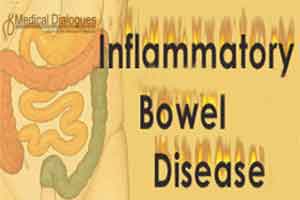- Home
- Editorial
- News
- Practice Guidelines
- Anesthesiology Guidelines
- Cancer Guidelines
- Cardiac Sciences Guidelines
- Critical Care Guidelines
- Dentistry Guidelines
- Dermatology Guidelines
- Diabetes and Endo Guidelines
- Diagnostics Guidelines
- ENT Guidelines
- Featured Practice Guidelines
- Gastroenterology Guidelines
- Geriatrics Guidelines
- Medicine Guidelines
- Nephrology Guidelines
- Neurosciences Guidelines
- Obs and Gynae Guidelines
- Ophthalmology Guidelines
- Orthopaedics Guidelines
- Paediatrics Guidelines
- Psychiatry Guidelines
- Pulmonology Guidelines
- Radiology Guidelines
- Surgery Guidelines
- Urology Guidelines
Strong connection between MI & inflammatory bowel disease : Study

Inflammation has long been recognized as playing a key role in the development of heart disease.Dr.Muhammad Panhwar a University Hospitals Harrington Heart & Vascular Institute researcher & colleagues explored a large database of more than 22 million patients to find the link of MI patients with inflammatory bowel disease IBD.The researchers concluded that there was a strong connection between Inflammatory Bowel Disease (IBD) and the development of heart disease and heart attacks.The study, "Risk of Myocardial Infarction in Patient with Inflammatory Bowel Disease," was presented at this year's American College of Cardiology meeting in Orlando, Fla.
Drs. Panhwar and Ginwalla used myocardial infarction as an indicator for heart disease for their research. They used IBM's Explorys, which is a large database that aggregates electronic medical records from 26 healthcare systems nationwide.
IBD is an umbrella term for two chronic inflammatory conditions that affect the gastrointestinal tract -- Ulcerative Colitis and Crohn's disease. The Centers for Disease Control estimates that nearly 3 million Americans have IBD, with 70,000 new cases emerging every year. While studies have shown a clear increased risk of heart disease in other chronic inflammatory conditions such as lupus and rheumatoid arthritis, this link is unclear in patients with IBD.
The 3-year study concluded that in the more than 22 million patients who were assessed, heart attacks were almost twice as common in patients with IBD (5.9 percent in patients with IBD compared to 3.5 percent in patients without IBD). They also found that traditional risk factors for heart disease such as high blood pressure, diabetes, and smoking were also more prevalent in patients with IBD. After adjusting for age, race, sex, and traditional heart-disease risk factors, Dr. Panhwar and his colleagues found that the patients with IBD had about 23 percent higher odds of having a heart attack.
Dr. Panhwar and colleagues also observed that the highest risk was in younger patients (less than 40 years of age), while IBD is commonly diagnosed between the ages of 15-30. Earlier age at diagnosis and female gender is associated with increased levels of inflammation and more aggressive and disabling disease.
"The disproportionately increased levels of inflammation in younger patients who may not otherwise have the traditional heart disease risk factors may explain the increased risk seen in these patients," said Dr. Panhwar. "Given that over 3 million people (~1.2 percent of the population) in the United States suffer from IBD, a large number of them may have heart disease that has gone under the radar. Our hope is that our study encourages more clinicians to screen these patients more aggressively for heart disease."
"Our study adds considerably to a growing set of literature highlighting the chronic inflammation in IBD as having a role in the development of cardiovascular disease," said Dr. Ginwalla, who is also Assistant Professor of Medicine at Case Western Reserve University School of Medicine. "Clinicians who care for patients with traditional cardiovascular risk factors who also have IBD should recognize IBD as a cardiovascular risk factor as well and treat it appropriately."
The study also highlights special populations that may be at particularly high risk such as young women and African-American patients who will benefit from closer monitoring and preventive screening.

Disclaimer: This site is primarily intended for healthcare professionals. Any content/information on this website does not replace the advice of medical and/or health professionals and should not be construed as medical/diagnostic advice/endorsement or prescription. Use of this site is subject to our terms of use, privacy policy, advertisement policy. © 2020 Minerva Medical Treatment Pvt Ltd